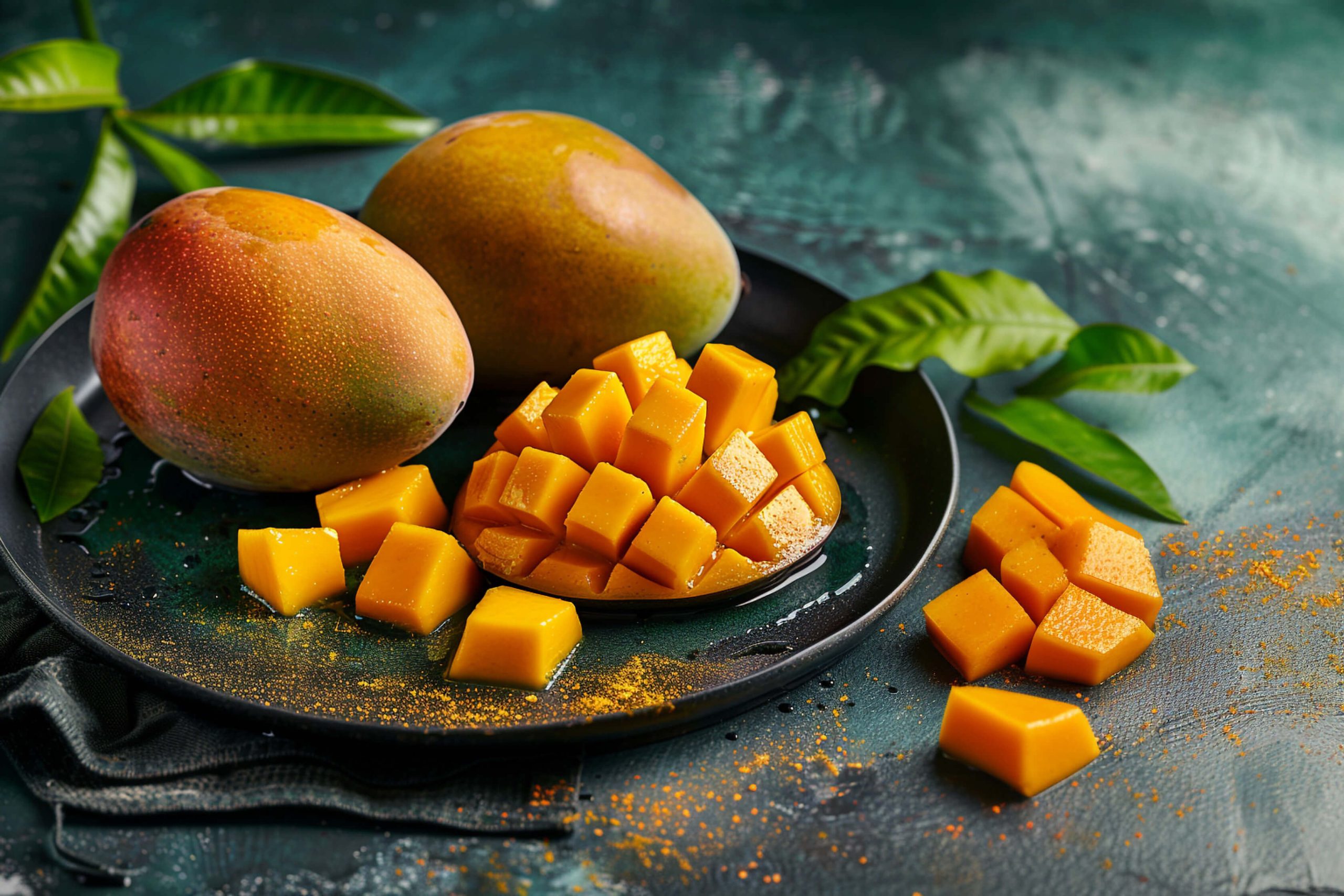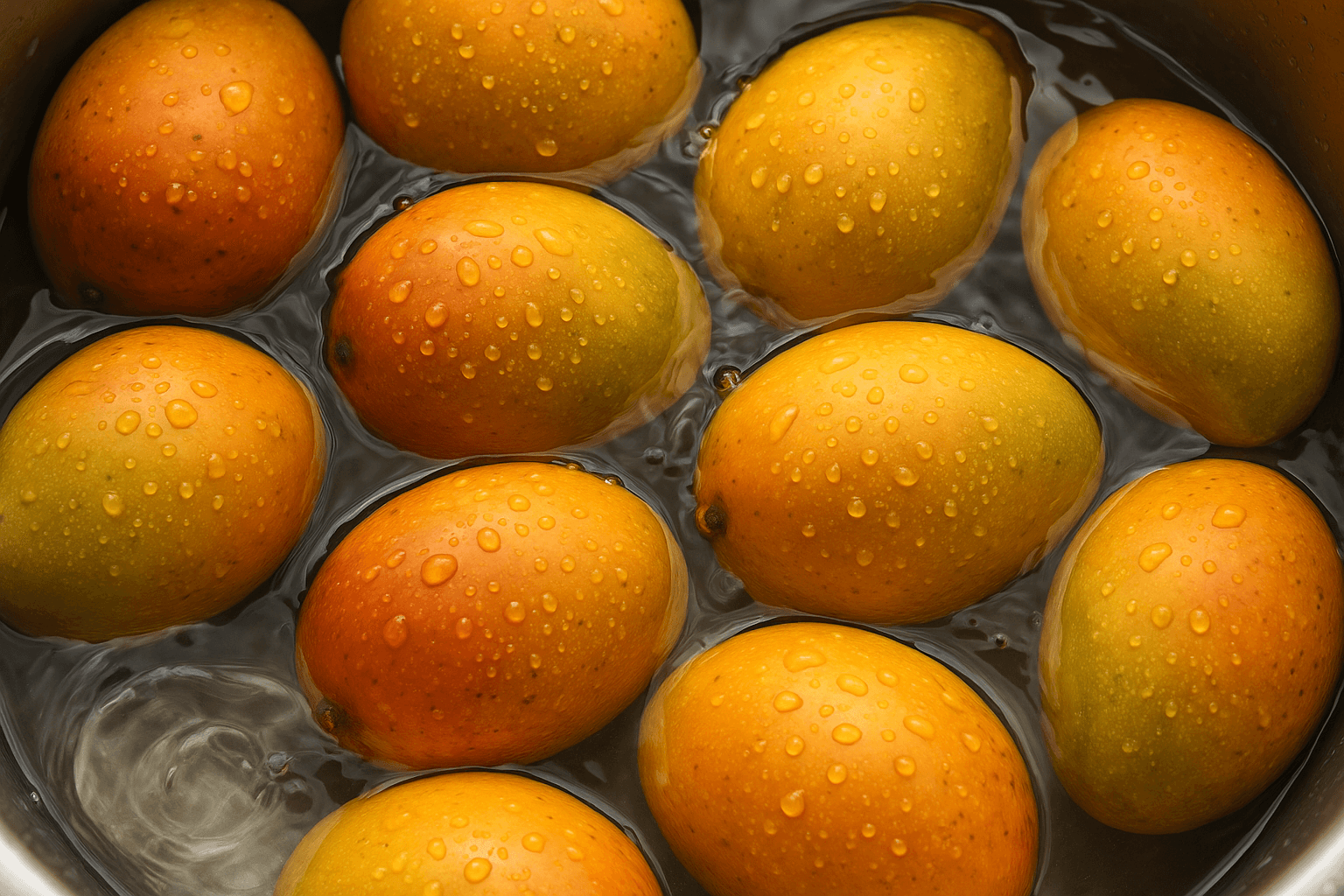Summer holidays, sunny afternoons, and mangoes — that’s the perfect vacation season. Mango-mode On.
Just after having a satisfying lunch, you’re thinking: ‘Let’s go now and eat mangoes peacefully’
But just as you reach out for that mango or any other sweet fruit after a meal, you hear a voice in your head (or someone else’s):
“Don’t eat fruits after meals! It causes fermentation, bloating, and sugar spikes!”
So, what’s the truth?
At Santushti, we believe that food should be a source of joy, not fear. So, let’s decode this mango confusion with both science and wisdom. Let’s clear this up once and for all—with real insight, not diet myths.
Can You Eat Mangoes After a Meal?

One of the most asked questions:
“What is the best time to eat mangoes without causing bloating or sugar spikes?”
The best time to consume any fruit, including mangoes, is early morning on an empty stomach with a few nuts or seeds (like almonds or pumpkin seeds).
Why?
Fats and proteins in seeds and nuts ensure carbohydrate load is distributed, preventing sudden sugar spikes..
But does that mean eating mangoes after lunch is always a no-no?
Not at all.
It depends on what you’ve eaten.
You Can Enjoy Mangoes After a Meal
If Your Meal Was…
- High in fiber (think veggies, whole grains),
- Rich in protein (dal, paneer, curd, legumes),
- Contained healthy fats (ghee, nuts, seeds),
- And had moderate carbs (a couple of rotis or a small portion of rice)…
…then having mangoes post-meal won’t send your blood sugar levels into chaos.
In fact, having a sweet fruit is a much better option than reaching for baked or dairy desserts like milk-sweets, pastries, or ice cream to curb your sugar cravings. A fresh mango isn’t just delicious—it’s a powerhouse of nutrition! Mangoes are packed with vitamin C, vitamin A, fiber, antioxidants, and natural sugars—without additives or chemicals—making them great for your immunity, skin, digestion, and overall health.
It’s better to avoid mangoes right after a heavy meal, like one with deep-fried foods or lots of dairy, or late at night, especially if you’re prone to acidity or feel too much body heat.
If you are diabetic or pre-diabetic, please be mindful of your mango portions and consult your dietitian.
So yes, you can eat mangoes after lunch—just mindfully and moderately. And definitely, without guilt.
Now that we’ve cleared the confusion about when to eat mangoes, here’s something just as important—but often missed. A simple mango ritual your dadi probably swore by (and guess what—science backs it too!).
A Simple Habit That Changes Everything
One of the most overlooked yet powerful habits is soaking your mangoes before you eat.
This is one piece of grandma’s wisdom that science happily agrees with. Soaking mangoes isn’t an old wives’ tale—it’s a digestive game-changer.
5 Surprising Benefits of Eating Soaked Mangoes

Here’s why you should soak them:
- Reduces phytic acid, improving mineral absorption
- Neutralizes the internal “heaty” nature of mangoes → prevents acidity, acne, or rashes
- Makes mangoes gentler on digestion, avoiding post-meal bloating or discomfort
- Helps remove pesticide residues and sap
- Enhances taste and hydration, making them sweeter and juicier
So, don’t forget to soak the mangoes before eating.
How long to soak?
Minimum 30 minutes in clean water at room temperature. Avoid refrigerating soaked mangoes immediately.
Mangoes are delicious—and good for you too—but like anything, moderation is key.
“One ripe mango a day is enough to enjoy its benefits without overdoing the sugar. It’s not about avoiding mangoes—it’s about eating them the right way and in the right amount.” — Lavleen Kaur, Dietitian, Santushti Holistic Health
So the next time you’re about to eat a mango – soak it, eat slowly, and listen to your body.
Because summer without mango? Matlab full ‘bore’ vacation season at Nani’s home!”
So keep Calm and Eat Aam.
With 15+ years of working closely with clients and patients, every tip and recommendation shared here is based on what’s worked in real life—not just in textbooks.
These insights are tried, tested, and trusted—So not to be taken lightly.
Also Read: Top 3 Fruits for Better Protein Absorption
Final Takeaway
Mangoes aren’t the enemy—no need to fear them! Yes, they’re sweet, and if eaten without care causes sugar spikes, bloating, or acidity. But with moderation and knowing the right time and way to enjoy them, mangoes can be a delicious, healthy part of your diet in summer.
At Santushti Holistic Healthcare & Healing, we encourage balance over restriction, and understanding over obsession. So go ahead—eat that mango. Just soak it, savor it, and smile while doing it.
Good health isn’t just about rules—it’s about a harmonious relationship with food, body, and life.
Love mangoes. Love your health. Love yourself
Ready to start your journey toward a healthier, happier you? Join us at Santushti and embrace a holistic path to well-being—guided by expert insights and the timeless wisdom of Indian Ayurveda.


Wow! Great stuff! As sweet as the mango itself.
Can a diabetic eat mango, with the usual precautions mentioned by you?
This was such a refreshing and well-balanced read—finally, a post that doesn’t demonize mangoes! I loved how you blended scientific insights with traditional wisdom, especially the tip about soaking mangoes